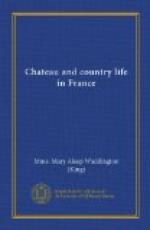I was there, the first time, in very hot weather, the 14th of July (the French National fete commemorating the fall of the Bastille). I went for a stroll in the park the morning after I arrived, but I collapsed under a big tree at once—hadn’t the energy to move. Everything looked so hot and not a breath of air anywhere. The moat looked glazed—so absolutely still under the bright summer sun—big flies were buzzing and skimming over the surface, and the flowers and plants were drooping in their beds.
Inside it was delightful, the walls so thick that neither heat nor cold could penetrate. The house is charming. The big drawing-room—where we always sat—was a large, bright room with windows on each side and lovely views over park and gardens; and all sorts of family portraits and souvenirs dating from Louis XV to the Comte de Paris. The men of the family—all ardent Royalists—have been, for generations, distinguished as soldiers and statesmen.
One of them—a son of the famous Marechal de S, brought up in the last years of the reign of Louis XV—carried his youthful ardour and dreams of liberty to America and took part, as did so many of the young French nobles, in the great struggle for independence that was being fought out on the other side of the Atlantic. Soon after his return to France he was named Ambassador to Russia to the court of Catherine II, and was supposed to have been very much in the good graces of that very pleasure-loving sovereign. He accompanied her on her famous trip to the Crimea, arranged for her by her minister and favourite, Potemkin—when fairy villages, with happy populations singing and dancing, sprang up in the road wherever she passed as if by magic—quite dispelling her ideas of the poverty and oppression of some of her subjects.
Among the portraits there is a miniature of the Empress Catherine. It is a fine, strongly marked face. She wears a high fur cap—a sort of military pelisse with lace jabots and diamond star. The son of the Marechal, also soldier and courtier, was aide-de-camp to Napoleon and made almost all his campaigns with him. His description of the Russian campaign and the retreat of the “Grande Armee” from Moscow is one of the most graphic and interesting that has ever been written of those awful days. His memoirs are quite charming. Childhood and early youth passed in the country in all the agonies of the Terror—simply and severely brought up in an atmosphere absolutely hostile to any national or popular movement.
The young student, dreaming of a future and regeneration for France, arrived one day in Paris, where an unwonted stir denoted that something was going on. He heard and saw the young Republican General Bonaparte addressing some regiments. He marked the proud bearing of the men—even the recruits—and in an explosion of patriotism his vocation was decided. He enlisted at once in the Republican ranks. It was a terrible decision to confide to his family, and particularly to his grandfather, the old Marechal de S. a glorious veteran of many campaigns and an ardent Royalist. His father approved, although it was a terrible falling off from all the lessons and examples of his family—but it was a difficult confession to make to the Marechal. I will give the scene in his own words (translated, of course—the original is in French).




